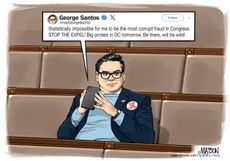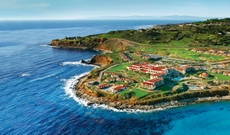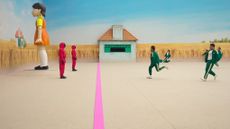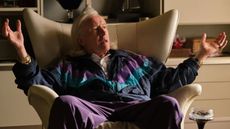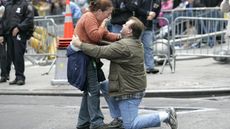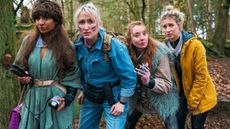Top Gear off air: how safe are UK film sets?
Three-quarters of film and TV crew felt safety had been compromised at work in industry survey
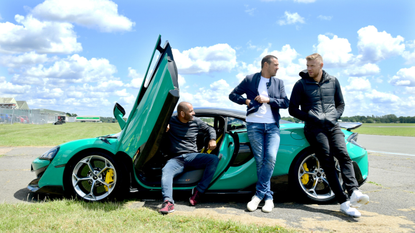
"Top Gear" will stop for the "foreseeable future", the BBC has announced.
Production of the TV show was paused after presenter Freddie Flintoff was involved in a "horrendous" car crash that "almost claimed his life" while filming at the Dunsfold Park aerodrome in Surrey last December, said Metro.
BBC Studios said that while an independent health and safety review of the show confirmed that production complied with industry best practice, "there were important learnings" to be taken forward following the near-fatal incident.
Subscribe to The Week
Escape your echo chamber. Get the facts behind the news, plus analysis from multiple perspectives.

Sign up for The Week's Free Newsletters
From our morning news briefing to a weekly Good News Newsletter, get the best of The Week delivered directly to your inbox.
From our morning news briefing to a weekly Good News Newsletter, get the best of The Week delivered directly to your inbox.
The crash is one of "a series of high-profile accidents" that has brought greater attention to the "hazards" presenters, actors and crew members face while filming, said the BBC's entertainment reporter Sophie van Brugen.
'Things simply haven't changed'
Hollywood actor Rory Kinnear's father, Roy Kinnear, died after being thrown from a horse in 1988 during production of "The Return of the Musketeers". He told van Brugen: "Thirty years later, things simply haven't changed."
Cameraman Mark Milsome was killed while filming a stunt sequence involving a Land Rover on the set of "Black Earth Rising" in Accra, Ghana in 2021. The fatal accident was "easily avoidable and just shouldn't have happened", said Kinnear. "Fundamentally, I don't think anyone has ever gone to the cinema and seen a shot and thought, that's worth dying for."
The cameraman's wife, Andra Milsome, has campaigned for greater safety on set ever since. But she says that despite the coroner asking for further evidence of safety protocols contacting organisations about the stunt safety and coordination, "ultimately nothing came of it" and "nothing has changed".
In a survey of 733 film and TV crew conducted by the Broadcasting, Entertainment, Cinematograph and Theatre Union (Bectu) and the Mark Milsome Foundation (MMF), almost three-quarters of film and TV crew said they "felt their safety or that of a colleague has been compromised at work". There was an "overwhelming consensus" that safety protocols and training needed improvement.
An unnamed industry worker told the BBC they had been on a number of shoots where risk assessments weren't completed until filming had wrapped. "Time pressure schedules always override health and safety."
'Time is now'
Former "Top Gear" presenter James May told the BBC's Today programme that he believes the show "does need a bit of a rethink. It's time for a new approach".
And pauses in production across the film and television industries during the pandemic and the recent Hollywood actors and writers strikes have "given people the chance to reassess", said van Brugen, with many believing the time for change "is now".
"Many crews have never had even the most basic training or advice on safe working," said Bectu national secretary Spencer MacDonald. He also highlighted the "dangerous long-hours culture" of working days frequently lasting more than 12 hours, on top of the expectation to "drive long commuting journeys" to and from production sites.
A proposed "solution" championed by the MMF and Bectu is the introduction of a "health and safety 'passport' for workers", said the BBC. They are calling for the film industry to commit to ensuring everyone working on a production has a Level 2 Production Safety Passport, and that those in supervisory positions are required to have a Level 3.5 Passport.
Christopher Ross, president of the British Society of Cinematographers, said: "All of the corporate bodies and all of the government bodies need to act in order to make this change. And if that requires a high level change of law – if that's what it takes – that's what it takes."

Continue reading for free
We hope you're enjoying The Week's refreshingly open-minded journalism.
Subscribed to The Week? Register your account with the same email as your subscription.
Sign up to our 10 Things You Need to Know Today newsletter
A free daily digest of the biggest news stories of the day - and the best features from our website
Julia O'Driscoll is the engagement editor. She covers UK and world news, as well as writing lifestyle and travel features. She regularly appears on “The Week Unwrapped” podcast, and hosted The Week's short-form documentary podcast, “The Overview”. Julia was previously the content and social media editor at sustainability consultancy Eco-Age, where she interviewed prominent voices in sustainable fashion and climate movements. She has a master's in liberal arts from Bristol University, and spent a year studying at Charles University in Prague.
-
 5 hilarious cartoons about the George Santos expulsion vote
5 hilarious cartoons about the George Santos expulsion voteCartoons Artists take on Santa versus Santos, his X account, and more
By The Week US Published
-
 Places that are already seeing a boost in tourism due to climate change
Places that are already seeing a boost in tourism due to climate changeThe Explainer Warmer temperatures are moving travelers north
By Devika Rao, The Week US Published
-
 6 snow-or-sun hotels to visit this winter
6 snow-or-sun hotels to visit this winterThe Week Recommends Make your winter dreams a reality at these properties
By Catherine Garcia, The Week US Published
-
 Doctor Who: 60 years of time-travelling tomfoolery
Doctor Who: 60 years of time-travelling tomfooleryWhy Everyone's Talking About Special episodes celebrate show's past as Whovians look forward to new seasons ahead
By Julia O'Driscoll, The Week UK Published
-
 Netflix's real-life Squid Game: 'reality epic' or 'shoddy knock-off'?
Netflix's real-life Squid Game: 'reality epic' or 'shoddy knock-off'?Talking Point 456 players battle it out for the biggest prize pot in reality TV history
By The Week UK Published
-
 Jimmy Savile: is The Reckoning a dramatisation too far?
Jimmy Savile: is The Reckoning a dramatisation too far?Talking Point Steve Coogan's BBC series deemed a 'lurid story told mainly for ratings'
By The Week Staff Published
-
 Sponsored weddings: a tradition for the Instagram generation
Sponsored weddings: a tradition for the Instagram generationTalking Point Brides and grooms are cashing in on brand deals to help cut costs
By Julia O'Driscoll, The Week UK Published
-
 France bans vegan ‘steaks’ and ‘ribs’
France bans vegan ‘steaks’ and ‘ribs’Talking Point French farmers and meat producers have long argued terms like ‘vegan sausage’ confuse customers
By Sorcha Bradley Published
-
 Are public marriage proposals getting out of hand?
Are public marriage proposals getting out of hand?Talking Point Previously private moment is ‘becoming a public event’ as companies cash in
By Chas Newkey-Burden Published
-
 Dogs in public places: paw form or about time?
Dogs in public places: paw form or about time?Talking Point Canine pets are being welcomed into UK churches, restaurants and even cinemas
By Sorcha Bradley Published
-
 Henpocalypse! review: ‘bawdy’ BBC Two comedy set in remote Wales
Henpocalypse! review: ‘bawdy’ BBC Two comedy set in remote WalesThe Week Recommends It may be ‘a bit coarse’ but the characters become more likeable as the series goes on
By The Week Staff Published
